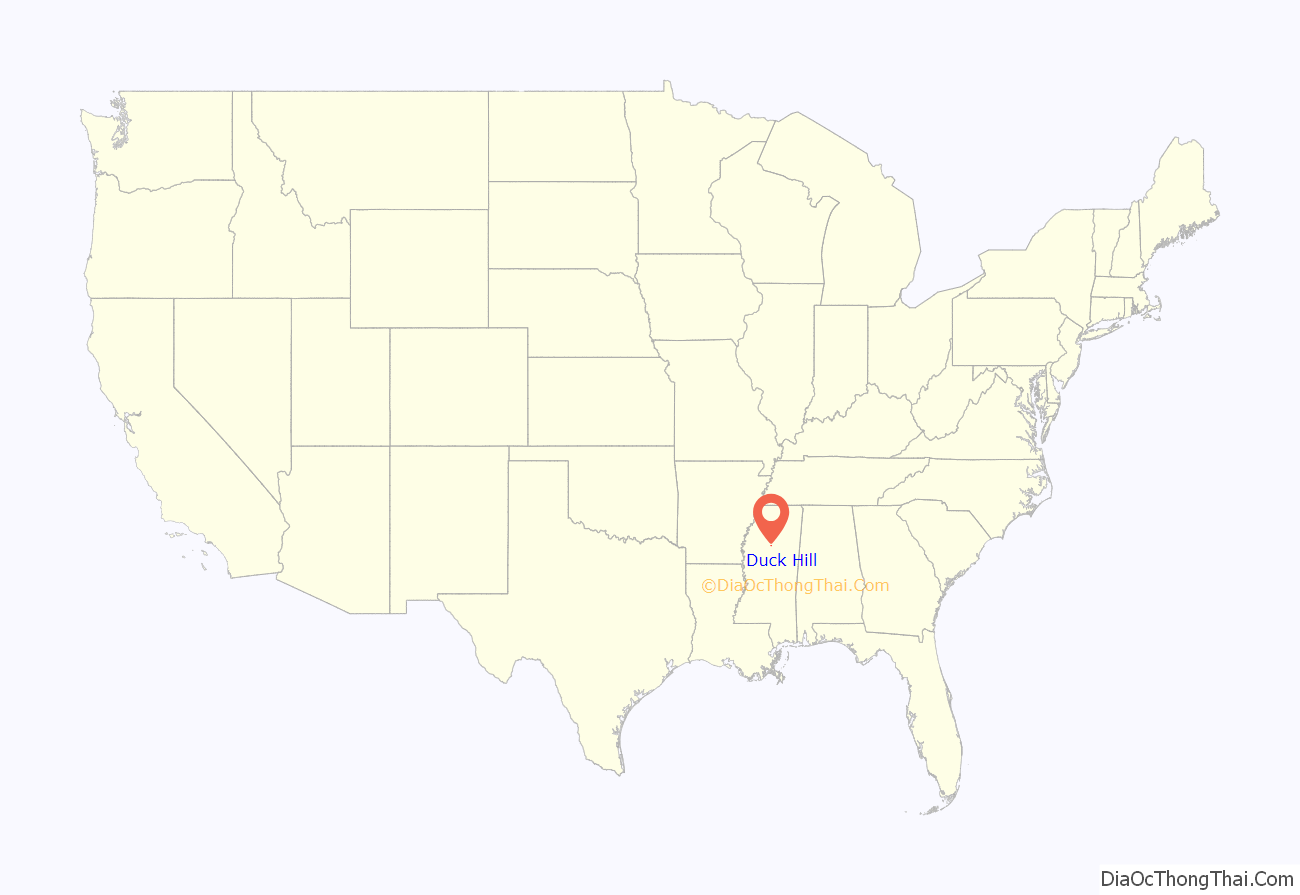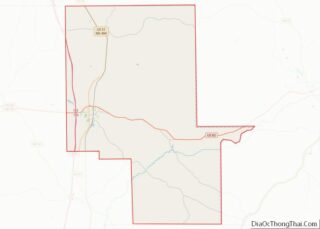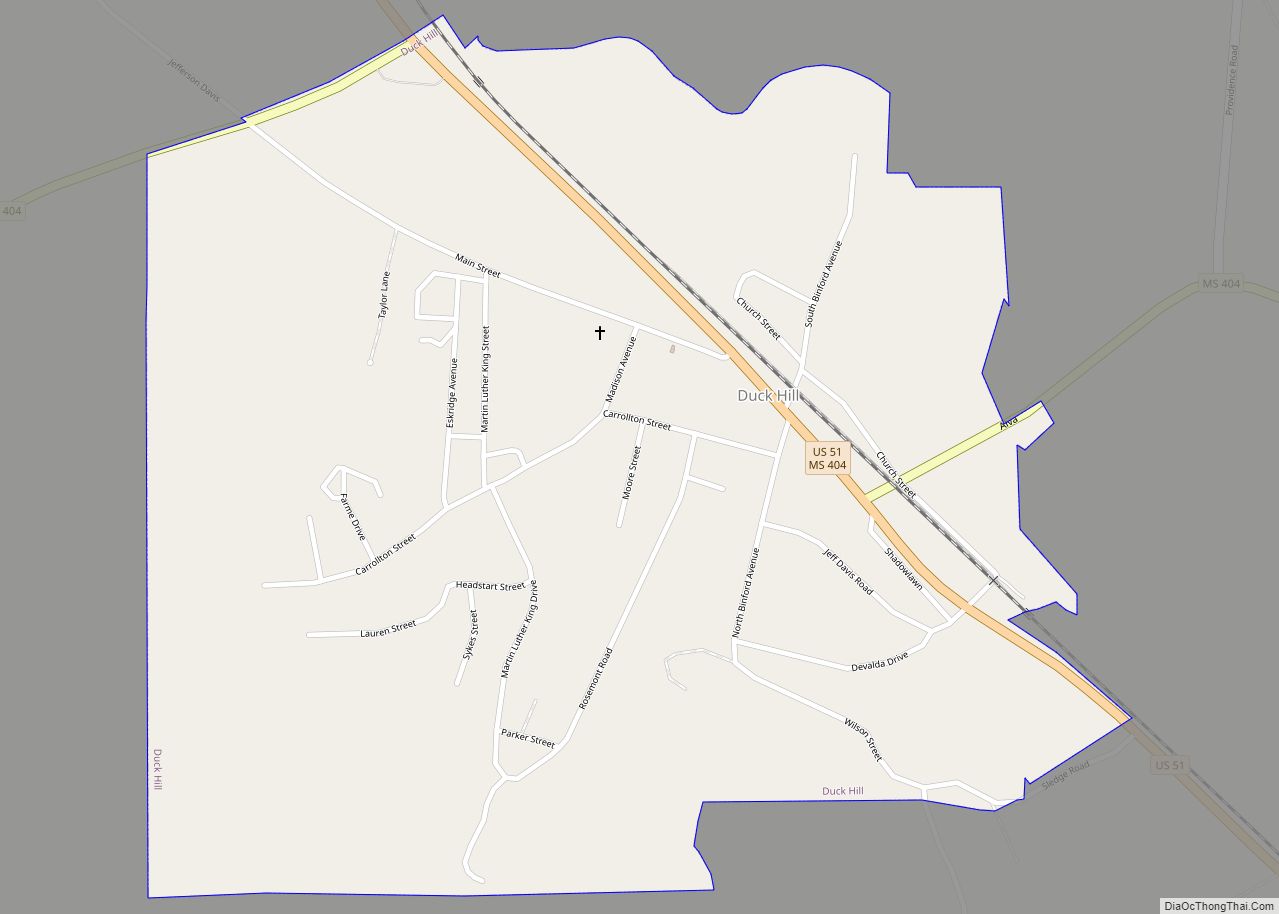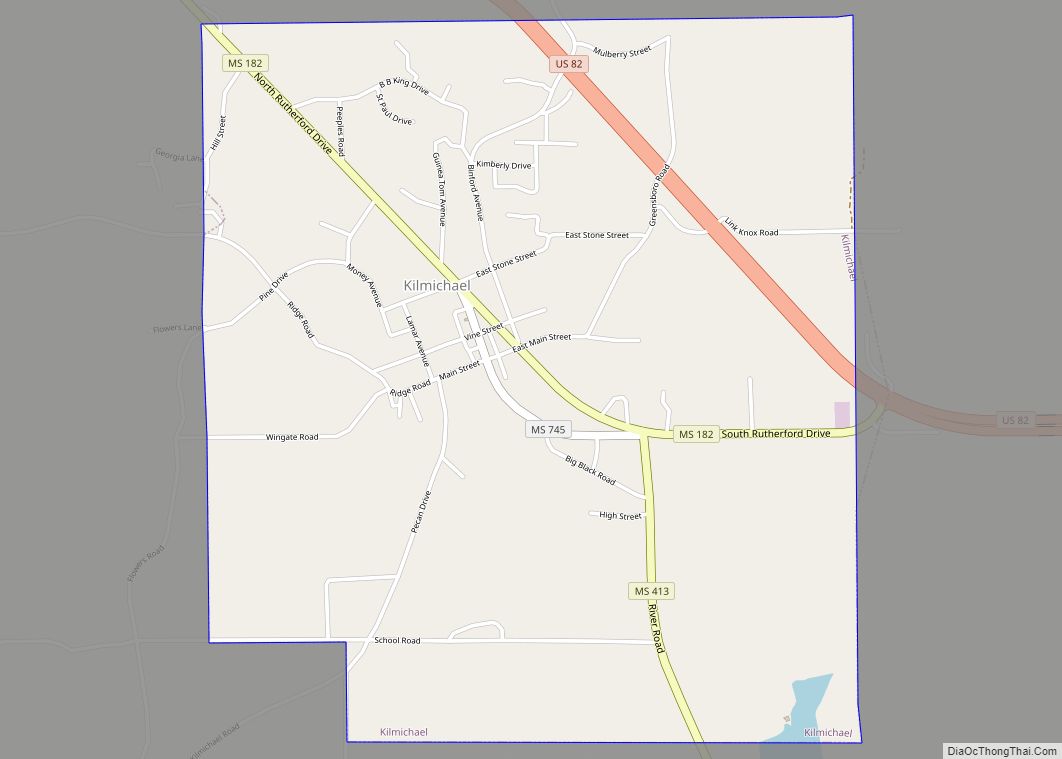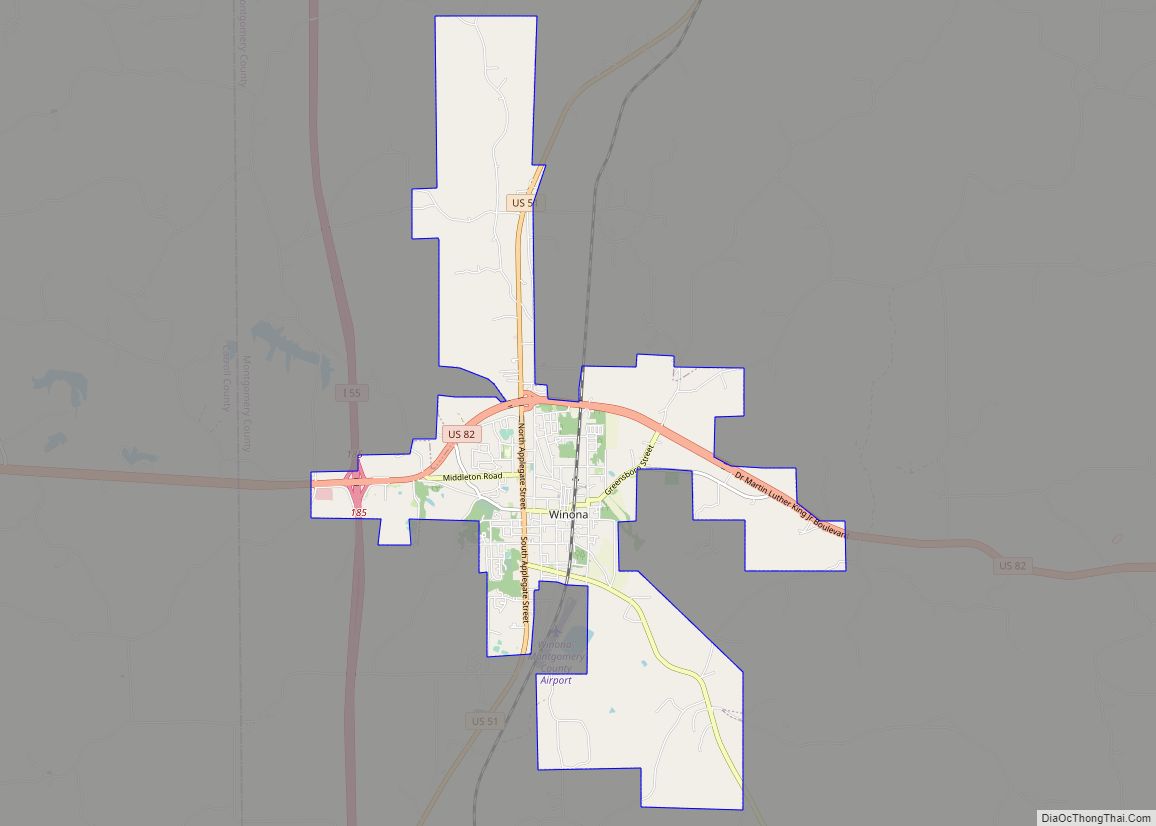Duck Hill is a town in Montgomery County, Mississippi, United States. The population was 619 at the 2020 census.
Duck Hill is located on U.S. Route 51, midway between Grenada and Winona. Big Bogue Creek flows east of the town.
The Lucie E. Campbell Gospel and Heritage Festival takes place each summer in Duck Hill.
| Name: | Duck Hill town |
|---|---|
| LSAD Code: | 43 |
| LSAD Description: | town (suffix) |
| State: | Mississippi |
| County: | Montgomery County |
| Elevation: | 253 ft (77 m) |
| Total Area: | 1.03 sq mi (2.68 km²) |
| Land Area: | 1.03 sq mi (2.68 km²) |
| Water Area: | 0.00 sq mi (0.00 km²) |
| Total Population: | 619 |
| Population Density: | 598.65/sq mi (231.12/km²) |
| ZIP code: | 38925 |
| Area code: | 662 |
| FIPS code: | 2820260 |
| GNISfeature ID: | 0669470 |
| Website: | montgomerycountyms.org/index.php?option=com_content&view=article&id=46&Itemid=53 |
Online Interactive Map
Click on ![]() to view map in "full screen" mode.
to view map in "full screen" mode.
Duck Hill location map. Where is Duck Hill town?
History
Duck Hill is named for a large hill northeast of the town, where “Duck”, a Choctaw chief, held war councils. Chief Duck was also a medicine man or shaman who treated his people. A statue of Chief Duck is located on U.S. Route 51 in Duck Hill, next to an old Illinois Central caboose.
The first European-American settler in the area was John A. Binford in 1834, who acquired land following Indian Removal of the Choctaw, who were forced to cede their lands to the United States. He built the first home in the area, and developed his property as a cotton plantation, based on enslaved African-American workers. He became one of the region’s most successful planters and large slaveholders. Binford was elected to the Mississippi Legislature. Duck Hill was a trading center for the cotton planters.
In 1856 the Illinois Central Railroad completed a line from Chicago to New Orleans, and it built a depot at Duck Hill. This stimulated its businesses. The line is now used for freight operation by the Grenada Railway.
A train wreck occurred at Duck Hill on October 19, 1862, when in the early morning hours two trains collided head-on, killing 34 men. Most of the dead were Confederate soldiers. It was the South’s worst loss of life in a train accident to that time.
During the Civil War, Binford’s sons, James R. and John A. Jr., helped lead the Confederate “Company E” from Duck Hill, known as the “McClung Rifles”. James R. Binford later was elected to the Mississippi State Senate. After white Democrats regained control of the state legislature following the Reconstruction era, he wrote the notorious Jim Crow laws for Mississippi.
In 1887, regional businessmen hoped that Duck Hill would become a thriving mill town after iron ore was found nearby. Financial speculation followed. Tour of our Southern Correspondent reported in The New York Times:
Duck Hill was the site of a railroad robbery in 1888. Two armed men, Rube Burrow and Joe Jackson, clung to the outside of a train as it left the station, then climbed to the engine cab. They ordered the engineer to stop the train about a mile north of town. The robbers plundered the express car’s safe of $3000, killing one man who tried to intervene.
20th century to present
In 1930, the Lloyd T. Binford High School opened in Duck Hill. (It was named for Lloyd T. Binford, son of state senator James R. Binford, who had become a Memphis insurance executive and film censor. He was noted for his views on “Southern womanhood” and white supremacy.) The city also built an agriculture education facility for its vocational students, who were overwhelmingly African American in the segregated system.
A new elementary school was constructed in 1963. The schools have since been closed because of declining population in the town.
The high school’s gymnasium is used as a community center. In 2012, a committee of volunteers was established to preserve the high school, which has suffered from vandalism.
During World War II, African Americans from across the country were among soldiers trained and stationed in the South. Many resented the segregation of public facilities they were forced to observe. In 1943, fifteen armed black soldiers from nearby Camp McCain came to Duck Hill during the night and began firing into the town. There were no injuries. The soldiers were upset about a recent white assault against a group of black soldiers at nearby Starkville.
Senator Trent Lott, whose father sharecropped a stretch of cotton field in Duck Hill during the 1940s, said in 1999 while supporting a bill for public education:
Duck Hill lynchings of 1937
The brutal lynching of two black men, Roosevelt Townes and Robert “Bootjack” McDaniels, in Duck Hill mid-day on April 13, 1937, gained national publicity. These were among nine lynchings of African Americans by whites in Montgomery County, Mississippi from the post-Reconstruction period into the 20th century. Most occurred in the decades near the turn of the 20th century.
The men had been arraigned in the Montgomery County Courthouse in the county seat of Winona, Mississippi, charged with murdering George Windham, a grocer in Duck Hill, in December 1936. Both men pleaded not guilty. Outside the courthouse a crowd had gathered, and then a group of 12 white men abducted the two accused men from the courthouse.
Townes and McDaniels were loaded into a school bus and driven to a wooded area near Duck Hill. Hundreds of white people followed, and a crowd estimated at 300-500 looked on as Townes and McDaniels were each chained to a tree. A blowtorch was used to torture them, until each confessed to Windham’s murder. Gasoline was doused on Townes, and on brush around him, and he was burned to death. McDaniels was riddled with bullets, and fatally shot through the head.
The police officers who had been guarding the two defendants said they were unable to identify any members of the mob. As was typical in lynching cases, no one was charged in the abduction or murders.
Newspapers carried a photograph of McDaniels’ burned and tortured body chained to a tree, and the lynchings were nationally condemned. German newspapers at the time used the murders for propaganda, contrasting the lynchings to controls in Nazi Germany under the “humane” Nuremberg racial laws.
Such publicity enabled Joseph A. Gavagan (D-New York) to gain support for anti-lynching legislation he had put forward in the House of Representatives; it was supported in the Senate by Democrats Robert F. Wagner (New York) and Frederick Van Nuys (Indiana). The legislation eventually passed in the House, but the white Democrats of the Solid South (most blacks in the region were disenfranchised) blocked it in the Senate, with Senator Allen Ellender even proclaiming, “We shall at all cost preserve the white supremacy of America.” Their colleagues had similarly defeated anti-lynching legislation in the 1920s that was passed overwhelmingly by the House.
Duck Hill Road Map
Duck Hill city Satellite Map
Geography
According to the United States Census Bureau, the town has a total area of 1.0 square mile (2.6 km), all land.
See also
Map of Mississippi State and its subdivision:- Adams
- Alcorn
- Amite
- Attala
- Benton
- Bolivar
- Calhoun
- Carroll
- Chickasaw
- Choctaw
- Claiborne
- Clarke
- Clay
- Coahoma
- Copiah
- Covington
- Desoto
- Forrest
- Franklin
- George
- Greene
- Grenada
- Hancock
- Harrison
- Hinds
- Holmes
- Humphreys
- Issaquena
- Itawamba
- Jackson
- Jasper
- Jefferson
- Jefferson Davis
- Jones
- Kemper
- Lafayette
- Lamar
- Lauderdale
- Lawrence
- Leake
- Lee
- Leflore
- Lincoln
- Lowndes
- Madison
- Marion
- Marshall
- Monroe
- Montgomery
- Neshoba
- Newton
- Noxubee
- Oktibbeha
- Panola
- Pearl River
- Perry
- Pike
- Pontotoc
- Prentiss
- Quitman
- Rankin
- Scott
- Sharkey
- Simpson
- Smith
- Stone
- Sunflower
- Tallahatchie
- Tate
- Tippah
- Tishomingo
- Tunica
- Union
- Walthall
- Warren
- Washington
- Wayne
- Webster
- Wilkinson
- Winston
- Yalobusha
- Yazoo
- Alabama
- Alaska
- Arizona
- Arkansas
- California
- Colorado
- Connecticut
- Delaware
- District of Columbia
- Florida
- Georgia
- Hawaii
- Idaho
- Illinois
- Indiana
- Iowa
- Kansas
- Kentucky
- Louisiana
- Maine
- Maryland
- Massachusetts
- Michigan
- Minnesota
- Mississippi
- Missouri
- Montana
- Nebraska
- Nevada
- New Hampshire
- New Jersey
- New Mexico
- New York
- North Carolina
- North Dakota
- Ohio
- Oklahoma
- Oregon
- Pennsylvania
- Rhode Island
- South Carolina
- South Dakota
- Tennessee
- Texas
- Utah
- Vermont
- Virginia
- Washington
- West Virginia
- Wisconsin
- Wyoming
